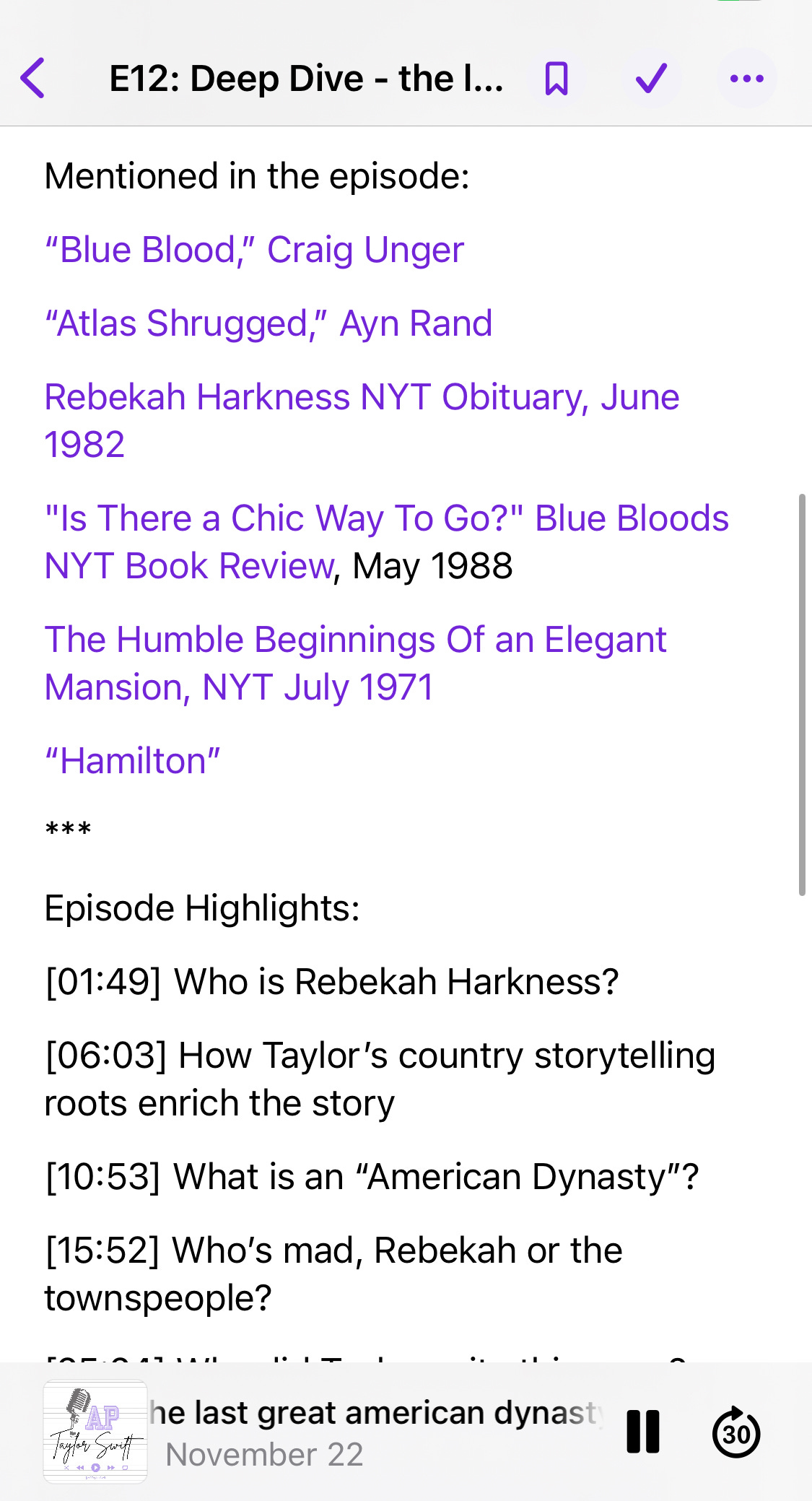I had a marvelous time...ruining everything
Deep Dive episode "the last great american dynasty" out now!
Champagne-filled pools. Sublime Atlantic Ocean beachfront property. Card games with Dali. Sounds terrible and middle class, no? …Yeah, we don’t buy it either!
This week we’re diving right into the waves of Watch Hill, Rhode Island as we explore “the last great american dynasty,” from folklore. If you’re not familiar with the song, this one is based on a real person—Rebekah Harkness—who owned Taylor’s Watch Hill, Rhode Island house and made enemies of everyone in town for it. We learn more about Rebekah Harkness, who she was, and why Taylor Swift wrote a song about her. What do Taylor and Rebekah Harkness have in common, besides owning the same home? Is Rebekah Harkness really “middle class”? How does Taylor build empathy for someone called “mad” and “shameless”? We had a marvelous time diving into this one!
As you listen, you might be thinking “wait! slow down! what’s that book or article or early 2000’s show you just mentioned?” Lucky for you, we list it all in our shownotes! Scroll 🔽 down within each episode and you’ll get links to everything we mention, including music, books, articles, and shows!
Today’s Extra Credit Brought to you by Jodi
Like any over-achieving Type A student, I do a lot of prep for these episodes. I talked in a previous extra credit about how I annotate lyrics. But for today’s deep dive, I got to do even more research on the topic itself—Rebekah Harkness.
Rebekah was a true character. The 1988 New York Times review of her biography Blue Blood, by Craig Unger, notes she “cleaned her pool out with Dom Perignon, put mineral oil in the punch at her sister's debutante ball and (all in the middle of the Great Depression) got tossed off an ocean liner for shouting obscenities, throwing dinner plates at an orchestra of Filipinos gamely playing the American national anthem, and offending the sensibilities of her fellow passengers by swimming nude - for which actions she counted herself witty.”
Rebekah’s marriage to second husband William (Bill) Harkness made her one of the wealthiest women in the world. While her eclectic tastes and eccentric life predated her marriage to Harkness, this influx of wealth certainly seems to have enabled her to live her life to the fullest. Among other escapades noted in the book review (because the book itself is $999 on Amazon and I did not get to read it myself):
She rang J. D. Salinger's bell dressed as a cleaning lady, having conceived the harebrained scheme that the reclusive writer's short stories be put to music.
She dyed chocolate mousse blue. She dyed a cat green.
She moved hundreds of thousands of dollars from one bank to another for the pleasure of confusing her accountants. She believed in reincarnation. She filled her fish tank with goldfish and Scotch.
Here was a woman who had all the money in the world, hung around with the upper echelon of society, and lived her own life however the hell she damn well pleased. Yet as we know from “the last great american dynasty,” Rebekah Harkness was seen as an outsider in this same upper crust society. She was called “mad” and “shameless” for her eccentricities, instead of being lauded and celebrated for her patronage to the arts, or her ability to be a truly unique individual at a time when conformity would have been a lot easier.
Reviewer Barbara Grizzuti Harrison noted about Rebekah’s story, “It might also have been interesting to see how a feminist writer would have assimilated the facts of Rebekah Harkness's sorry life. Might Mrs. Harkness be seen as a casualty of her own doomed and defiled expectations? Unfit for mothering, unfit for ordinary love, unfit - untrained - to be the caretaker of a great fortune, was she altogether silly or altogether bad? Was she power or pawn? And how in the world did she get that way?”
I go back to this thought, “how a feminist writer would have assimilated the facts of Rebekah Harkness’s sorry life,” whenever I hear “the last great american dynasty.” I imagine Taylor Swift buying Holiday House at the age of 24, looking up its history, and discovering Rebekah Harkess. She finds a copy of Blue Bloods, long out of print and forgotten, and learns about the woman who converted this beachside home into one with 8 kitchens and 21 baths (does it still have 8 kitchens and 21 baths, I wonder?). She reads what the New York Times calls a “terrible story…it makes no sense - and no sense is made of it.” Yet she sees pieces of herself in this woman—independent, successful, artistic, creative, social, quirky, hated by her town, misunderstood by her peers, an outcast, defined not by her success but by her relationship to the men in her life. She gets to the line about wondering how a feminist writer would capture Rebekah’s story, and she thinks, “oh…I’m that writer!”
Taylor writes incredible love songs. But the songs I love most are the ones she writes that critique the society we live in. In particular, I love when that criticism is about how a woman’s worth and value are measured according to her relationship to men and children. This song may at first sound like it’s about Rebekah, but really it’s about the townspeople. The society who called her mad, shameless, and loud. Who didn’t see her as an individual, but as the woman who “ended” the last great American dynasty because it was “her fault his heart gave out.” The society that, despite the massive success of her career, creativity, and Eras tour, spends more time focused on who Taylor Swift is dating than what she herself has accomplished as a songwriter, singer, and artist.
She’s having a marvelous time…ruining everything we think about what it means to be a successful woman.








You were right, Jodi, reading the notes is a must that enhances the experience of the podcast. Definitely going back to read all the notes!